Lately I've been thinking more how my job really relates to the mission of eradicating poverty. After all, that's what I came out here to help with. I feel like it's important to make this connection, because sometimes I need the internal motivation.
I know how important it is to tie all work back in to the overall strategic plan. So how am I doing that? One of the pillars of Yehu’s strategy is to improve and increase institutional capacity. So what do I have to do with that? I am taking the current reporting structure and streamlining it and making the results more useful. I’m eliminating and automating steps in the compilation of the data, and I’m putting the outcome into a format that will allow at-a-glance utility, in the form of summary tables, charts, and ratios. This also means higher quality control. I’m helping these people to work smarter, in my own little niche.
In the short run, I will get to see the effects of these tables. I’ve completed enough of the reports already to know how much time will be saved by implementing the changes I’ve created. This will free up Omar's schedule to focus on the actual analysis of the data, or to improve other processes that he just doesn’t have time for now. Also, because he will be compiling the tables more quickly and because they’re already in a format that is easier to analyze, Adet and the branch managers will have access to them sooner, which means that they can spot areas that need improvement more quickly and act on them before any problems grow too large.
In the medium term, as Yehu grows and more branches are formed, this will not translate into more work for Omar in compiling the reports because everything is automated. He’ll just have to do a little work upfront to add rows to the tables to account for the new branch, and then continue doing everything as it is already being done.
The long-term effects, I will not be around to see. But this is where I’ve found I can connect my efforts to eradicating poverty. With the savings of time I’m giving to Omar, he won’t have to work so hard, which will give him more of a chance to find ways to work smarter. He may find new types of information to gather from branches that will give them a greater scope of what is happening. Or he'll actually get to take a Saturday off every so often. I think the biggest difference will be in the information that is delivered in a timely manner to management. They can make changes more quickly, and spot areas that need tending to before they get out of hand. They can put more focus in areas that are growing faster, let go of employees that aren’t carrying their own weight, and know which sub-branches are ready to grow, and which to hold back. They will have a more complete picture of the state of their respective areas, and thus they’ll be able to be more effective in reaching out to those who are in need of the loans Yehu can give.
Voila. This summer, I am eradicating poverty.
Monday, June 29, 2009
Sunday, June 14, 2009
Life at Yehu and CHOICE Humanitarian
Work has been interesting. I've been learning a lot about what it's like to be a non-profit company that is still trying to grow and be self-sufficient. Yehu has made incredible progress over the past couple years. There is just still so much to be done, but who will do the work? The corporate staff is all stretched so thin. They work long days and come in on the weekends. (Although you would never know when you talk to them - they are all so kind and I've seen no outward displays of any kind of stress that they're all no doubt feeling.)
Yehu needs more employees who are qualified, but they just can't afford to pay the kind of salary that would attract said employees. And at the same time, they've got some heavily aggressive expansion plans over the next couple years. Who is going to market this to new potential clients, and who is going to accommodate these new clients when everyone is already so busy? Enter the interns. This year we're focusing on solidifying the strategic plan, and next year they'll be more marketing/communications-based.
Yehu is definitely making the most of having access to educated, free labor. I've been keeping very busy with working on my own projects, and with helping the stats guy, Omar, to get caught up. One of the big things I'm focusing on here is making processes more efficient - using shortcuts where they're available, eliminating steps that aren't necessary, and so on.
I'm learning that the corporate office may have some inefficiencies, but one of the biggest problems is getting those in branches out in the bush to use technology. They all have access to Excel and have been given forms they simply have to fill in, but they still turn in handwritten numbers. Perhaps they don't trust the technology, perhaps they just don't want to have to deal with the learning curve and they're comfortable with the way it is. I'm hoping to make it out to some villages to do a little training with these people, to help them to get more comfortable with what they have. Plus, I think meeting with people in the villages will be one of the best ways to incentivize me to keep going - I'll be able to really connect what I'm doing with where it's going.
With that in mind, today I visited Samburu (north of Mombasa) with people from CHOICE Humanitarian, which works sort of in conjunction with Yehu. They're working on the communications aspect - interviewing people in villages for videos they'll put on their website. I think especially with my generation, this is one of the best ways to get the word out and get people involved. It creates such a personal touch, and lets people see exactly who is being affected by their efforts, and how. It's exciting, to be involved on such a grassroots level.
I'm including some pictures from my visit to Samburu. My two biggest take-aways were that these people are all extremely hard-working, and that they are all so happy.
Yehu needs more employees who are qualified, but they just can't afford to pay the kind of salary that would attract said employees. And at the same time, they've got some heavily aggressive expansion plans over the next couple years. Who is going to market this to new potential clients, and who is going to accommodate these new clients when everyone is already so busy? Enter the interns. This year we're focusing on solidifying the strategic plan, and next year they'll be more marketing/communications-based.
Yehu is definitely making the most of having access to educated, free labor. I've been keeping very busy with working on my own projects, and with helping the stats guy, Omar, to get caught up. One of the big things I'm focusing on here is making processes more efficient - using shortcuts where they're available, eliminating steps that aren't necessary, and so on.
I'm learning that the corporate office may have some inefficiencies, but one of the biggest problems is getting those in branches out in the bush to use technology. They all have access to Excel and have been given forms they simply have to fill in, but they still turn in handwritten numbers. Perhaps they don't trust the technology, perhaps they just don't want to have to deal with the learning curve and they're comfortable with the way it is. I'm hoping to make it out to some villages to do a little training with these people, to help them to get more comfortable with what they have. Plus, I think meeting with people in the villages will be one of the best ways to incentivize me to keep going - I'll be able to really connect what I'm doing with where it's going.
With that in mind, today I visited Samburu (north of Mombasa) with people from CHOICE Humanitarian, which works sort of in conjunction with Yehu. They're working on the communications aspect - interviewing people in villages for videos they'll put on their website. I think especially with my generation, this is one of the best ways to get the word out and get people involved. It creates such a personal touch, and lets people see exactly who is being affected by their efforts, and how. It's exciting, to be involved on such a grassroots level.
I'm including some pictures from my visit to Samburu. My two biggest take-aways were that these people are all extremely hard-working, and that they are all so happy.
Tuesday, June 9, 2009
Random facts and random stats
For those of you who don't know, I like stats. I've actually been collecting a few since I got here, for all of you to enjoy...
* Power outages at work or home: 5
* Times I’ve washed my laundry by hand: 3
* Number of mosquito bites I’ve gotten on the inside of my right leg, from my knee to the bottom of my foot: 14
* Number of mosquito bites I’ve gotten everywhere else: 6
* Pirate ships I’ve seen: 1 (Come on, humor me. Doesn’t that look like a pirate flag?)
* Times I’ve succeeded: 1
* Hours I spent in the Yehu Senior Management meeting last week: 7.5
* Number of roommates (permanent or temporary) I’ve had here so far: 8
* Number of shillings we’re paying for each Swahili-speaking lesson we get from Adet’s wife: 250
Now, for some facts…
There is one word in Swahili for “aunt” and three for “uncle.” Apparently when it’s an uncle you need to clarify whether you’re talking about your dad’s older brother (baba mkubua), your dad’s younger brother (baba mdogo), or your mom’s brother (mjoba), but when it’s an aunt (shangazi), you can just go ahead and leave it at that.
The respectful term used for older women is Mama. There are two women in our office that everyone calls Mama Rose and Mama Rita. I’ve found it to be really endearing, whether or not this is the actual intention of such usage.
Kenyans are all obsessed with Obama. They sell kangas (A.K.A. sari, lava-lava, sarong, etc.) with Obama’s face on them, and women in the little distant villages in the bush wear them with pride. They even named a street in Mombasa after him. The upside for me: Since Obama is associated with America, Kenyans love all Americans. I think we can all agree that this is a good thing.
Work here has been quite interesting. In short, there is much work to be done and not enough people to do it. I'm doing what I can, though, to simplify the processes they're currently using. I've seen a lot of room for shortcuts, and a lot of possibilities to eliminate steps to make this system a little more efficient. Hopefully I can make some solid changes here that will last long after I'm gone. Next time I post, I'll tell you more about what the work environment is like at Yehu.
Tuesday, June 2, 2009
Week one in Kenya
I've had a chance to upload some pictures, so you can see what Kenya is like. This is the entrance of Yehu.
It's interesting adjusting to the way things are done here - not only in the culture of Kenya, but the culture of a small non-profit that is trying to grow. It is expensive to hire full-time employees who have the intellectual capital they need to really make things happen, which is why they depend on the interns so much when we come here. The difficulty with this setup is that things take a long time to get done around here, so we may not finish all of the projects we begin before we leave.
There is so much that is not yet structured or set in stone, so it gives a lot of freedom in the work I do (a major change from the structure I was used to at the Census). I see a lot of opportunities to do exciting things out here once my main project is finished - mostly out in the field. One possibility is to take pictures of all of the clients and get information about who they are and what they plan to do with their micro loans. (Can you imagine how fascinating those mini interviews would be?) We could partner with Kiva and use these pictures and bios to really get the word out to more potential donors. Nowadays, online is the way to go.
Because Internet is so spotty, they don't rely on email very much, and printing is expensive too, so most everything in the corporate office is passed around with flash drives. They don't really have the funds to buy any extra computers for the interns, so we've all brought our own from home. (FYI, Africa is not very Mac compliant. Take note, Mac users.) Here is the desk/office area I share with Andi and Aaron (and probably soon to be a few more), and we're fixin' to dig into our lunch, which was conveniently brought to us in little black baggies that were tied shut.
Mmm…beef stew and rice…
Kenya’s Independence Day was on June 1, which meant we all got a 3-day weekend. We took advantage and headed south. We got to visit the Coast Coconut Farms factory to see the process of making coconut oil.
It was interesting! They husk the coconut…
Crack it open and shred all the meat out…
Then you dry out the meat and press out all the oil. Anyone want me to bring them back some? Oh, by the way, apparently it solidifies at 78 degrees Farenheit. That's not a problem, is it?
They even use the old shells to make charcoal. How many of you knew that coconut shell charcoal was a valuable commodity? (This is Luis Pope, one of the founders of Yehu and head of the Pope Foundation. I can’t say enough good things about him. He is such a generous man, beloved by many people in the Mombasa area. He’s taken over 20 trips to Kenya over the last 10 years.)
We also visited Mwambalazi, Yehu’s first branch (there are now six). My first trip into the bush. It was enlightening!
This is Mwambalazi's well. They use this water for drinking, cooking, and bathing.

The branch meetings take place in this little hut, and this man is the groundskeeper.
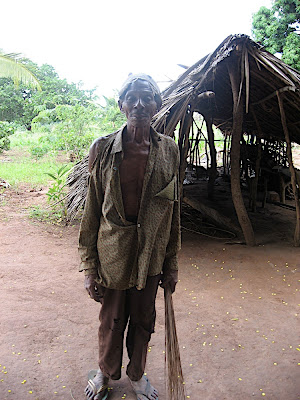
We visited one family and got to meet the three wives and all of their darling children.
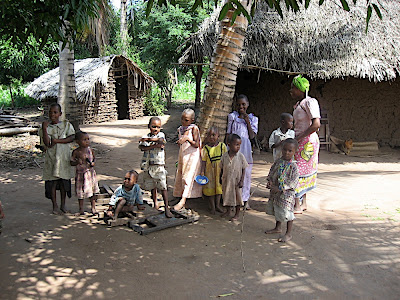
They weren’t afraid of us, for the most part…probably because of all the Yehu reps who come to the village.
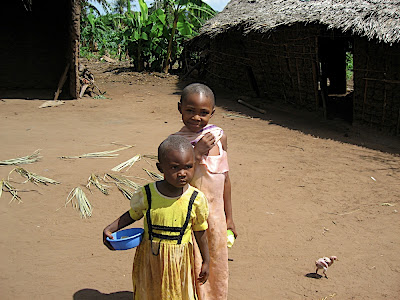
Smiling at the camera is not a process kids here have been conditioned to do, so they just stare at the strange silver box you point at them. I am very proud of this picture. I think it’s my favorite so far. What do you see in these little eyes?
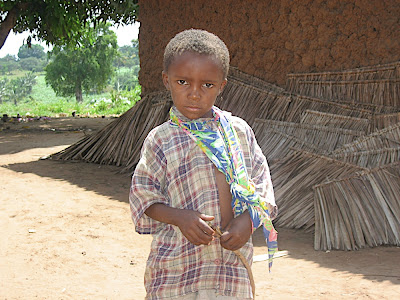
We also stopped by the beach. Let it be documented: this was the first opportunity I've ever had to dip my toes in the Indian Ocean.
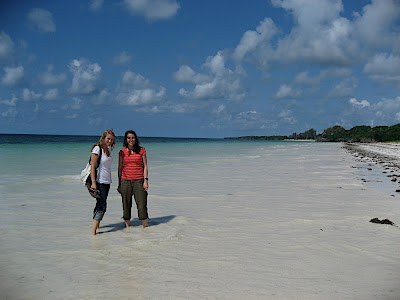
The branch meetings take place in this little hut, and this man is the groundskeeper.
We visited one family and got to meet the three wives and all of their darling children.
They weren’t afraid of us, for the most part…probably because of all the Yehu reps who come to the village.
Smiling at the camera is not a process kids here have been conditioned to do, so they just stare at the strange silver box you point at them. I am very proud of this picture. I think it’s my favorite so far. What do you see in these little eyes?
We also stopped by the beach. Let it be documented: this was the first opportunity I've ever had to dip my toes in the Indian Ocean.
One day we took a walk after work before we jumped on a matatu and headed home. I just wanted to be out in the middle of everything, in slow motion. It's so much easier to experience the true character and personality of a place. We were able to get a closer look at the people, the street vendors and their wares, the scents and billboards...the general pulse of Mombasa. Cognizant of the fact that we already stand out, I tried to subtly (and sometimes not so subtly) snag some photos of the real world - Mombasa style.
Anywhere there is a pothole around here, the lid is missing. There's metal in that lid, which means quality material for a roof. Thus, the lids never last. Rather than leaving a gaping hole in the sidewalk for people to fall in, they just cover it up with something else!
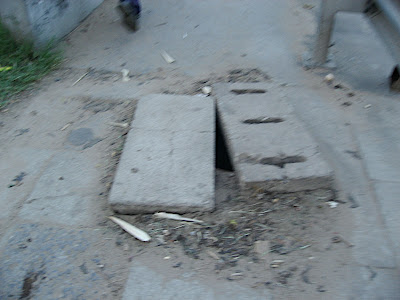
This is the view from the bridge we cross to get back to Nyali. Since Mombasa is technically an island, it's all salt water.
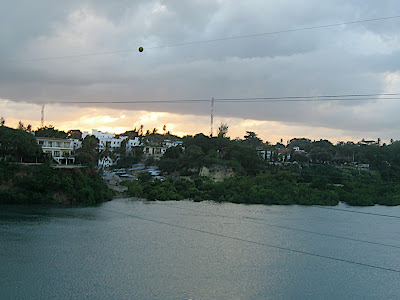
This is the view from the bridge we cross to get back to Nyali. Since Mombasa is technically an island, it's all salt water.
A very typical sight of Mombasa - a matatu (packed with people since it's rush hour).

Another very common sight:

Another very common sight:
I often see these men pulling their overloaded carts. Most of them are barefoot. Often, their loads are so huge that they have two or three more men pushing the cart from behind. These are seriously heavy loads - you can see how hard they are straining, how much they are sweating, and how hardened their muscles have become from doing this every day. I even saw one guy hanging from the handles of one, putting all of his body weight into it, while three other guys lifted it from behind so they could get it started rolling. It was deeply humbling to see how hard they were all working, and then to think that this was all probably to take home the tiniest fraction of what we'd make in a half hour of sitting at a desk in an air-conditioned office in America. It was a powerful reminder - this is why I'm here. I can't help all of them, but I can help some.
Subscribe to:
Comments (Atom)
